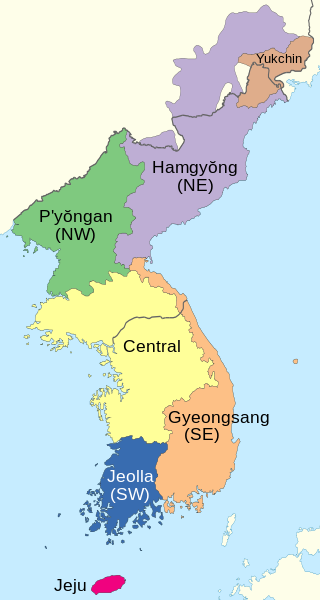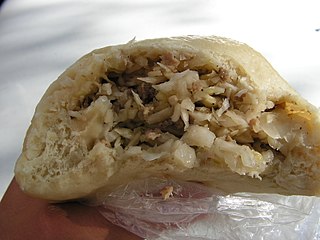
The Russian Far East is a region in Northeast Asia. It is the easternmost part of Russia and the Asian continent; and is administered as part of the Far Eastern Federal District, which is located between Lake Baikal in eastern Siberia and the Pacific Ocean. The area's largest city is Khabarovsk, followed by Vladivostok. The region shares land borders with the countries of Mongolia, China, and North Korea to its south, as well as maritime boundaries with Japan to its southeast, and with the United States along the Bering Strait to its northeast.

Koreans are an East Asian ethnic group native to Korea. The majority of Koreans live in the two states of North and South Korea, which are collectively referred to as Korea. As of 2021, an estimated 7.3 million ethnic Koreans resided outside of Korea. Koreans are also an officially recognized ethnic minority in other Asian countries, including China, Japan, Kazakhstan, Russia, and Uzbekistan. Outside of Asia, sizeable Korean communities have formed in Germany, the United Kingdom, France, the United States, Canada, and Oceania.

A number of Korean dialects are spoken on the Korean Peninsula. The peninsula is very mountainous and each dialect's "territory" corresponds closely to the natural boundaries between different geographical regions of Korea. Most of the dialects are named for one of the traditional Eight Provinces of Korea. Two are sufficiently distinct from the others to be considered separate languages, the Jeju and the Yukjin languages.

The Korean diaspora, also known as Hanin, consists of around 7.3 million people, both descendants of early emigrants from the Korean Peninsula, as well as more recent emigres from Korea. Around 84.5% of overseas Koreans live in just five countries: China, the United States, Japan, Canada, and Uzbekistan. Other countries with greater than 0.5% Korean minorities include Brazil, Russia, Kazakhstan, Vietnam, the Philippines, and Indonesia. All these figures include both permanent migrants and sojourners.
Koryo-saram is the name which ethnic Koreans in the post-Soviet states use to refer to themselves. The term is composed of two Korean words: "Koryo", a historical name for Korea, and "saram", meaning "person" or "people".
German Nikolaevich Kim is Director of the Institute for Asian Studies at Al-Farabi University, Kazakhstan and one of the leading internationally recognized scholar of the Koryo-saram.
Koryo-mar, Goryeomal, or Koryŏmal, otherwise known as Gore-mal (고레말) by speakers of the dialect, is a dialect of Korean spoken by the Koryo-saram, ethnic Koreans in the countries of the former Soviet Union. It is descended from the Hamgyŏng dialect and multiple other varieties of Northeastern Korean. Koryo-mar is often reported as difficult to understand by speakers of standard Korean; this may be compounded by the fact that the majority of Koryo-saram today use Russian and not Korean as their first language.

Sakhalin Koreans are Russian citizens and residents of Korean descent living on Sakhalin Island, who can trace their roots to the immigrants from the Gyeongsang and Jeolla provinces of present-day South Korea during the late 1930s and early 1940s, the latter half of the Japanese colonial era.

Russia–South Korea relations or Russian–South Korean relations are the bilateral foreign relations between Russia and South Korea. Modern relations between the two countries began on September 30, 1990.
Vietnamese people in Russia form the 72nd-largest ethnic minority community in Russia according to the 2002 census. With a population of 26,205, they are one of the smaller groups of overseas Vietnamese. Unofficial estimates put their population as high as 100,000 to 150,000. However, the real number of Vietnamese in Russia is often hard to analyze, due to large number of illegal Vietnamese immigrants living underground across Russia and due to the nature of the Vietnamese–Russian relations.
Russians in Korea do not form a very large population, but they have a history going back to the Korean Empire. The community of Russian subjects/citizens in Korea has historically included not just ethnic Russians, but members of minority groups of Russia as well, such as Tatars, Poles, and, more recently, return migrants from among the Koryo-saram and Sakhalin Koreans.

North Koreans in Russia consist mainly of three groups: international students, guest workers, and defectors and refugees. A 2006 study by Kyung Hee University estimated their total population at roughly 10,000.
Russian South Korean or South Korean Russian may refer to:

Kazakhstan–South Korea relations are the international relations between Kazakhstan and the South Korea.

Morkovcha, also known as Korean-style carrots or Korean carrot salad, is a spicy marinated carrot salad. It is a Koryo-saram variant of kimchi.
Soviet Koreans may refer to:

Pyanse or pigodi is a Russo-Korean steamed pie, bun, or dumpling stuffed with cabbage and meat. It is a popular dish in the Russian Far East, as well as in Koryo-saram communities of Central Asia.

South Korea-Uzbekistan relations are the international relations between South Korea and Uzbekistan.









